The Turner Clinic: 25 years of defending the environment
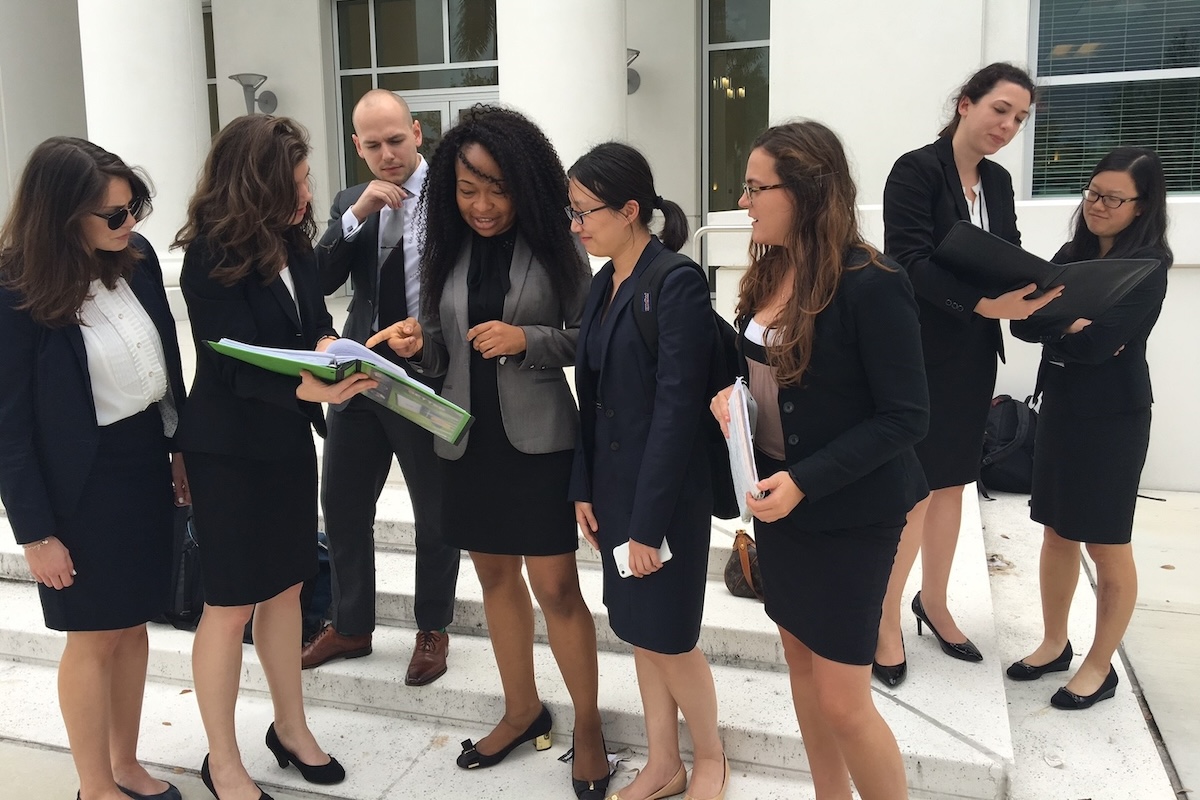
In 1997, Ted Turner was the world’s most visible and outspoken environmentalist. After conquering baseball, sailing, and 24-hour news, Turner made international headlines with a $1 billion pledge that not only created the United Nations Foundation, but also challenged other multi-billionaires to give on the same scale.
A year later, the Turner Foundation established Emory Law’s Turner Environmental Law Clinic, which recently celebrated 25 years of public service. The clinic’s areas of emphasis are well-defined: clean and sustainable energy; regenerative agriculture and local food systems; natural resource protection; and environmental justice.
“We chose Emory because I knew they would produce environmental lawyers who were up for a fight,” Turner said. “And the clinic’s model set us up to do good now and into the future.”
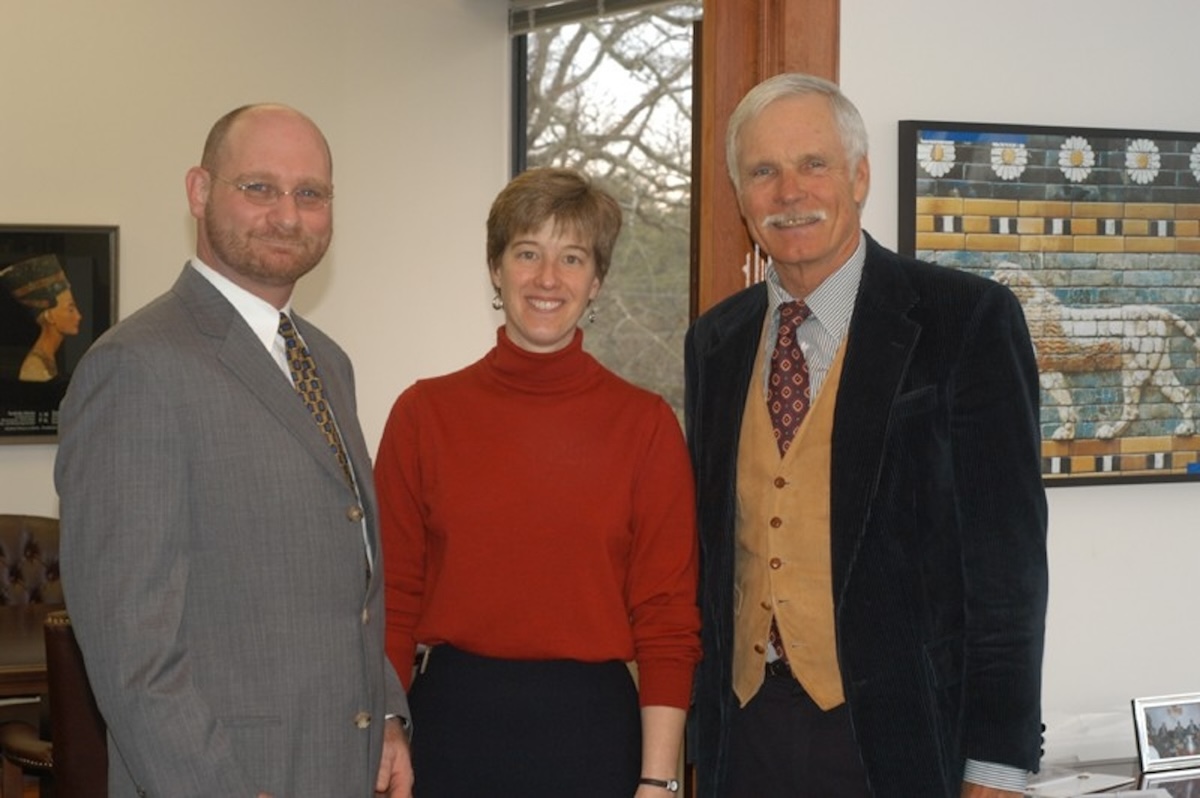
Ted Turner, right, with former clinic directors Larry Sanders and Julie Mayfield
The clinic has trained a generation of law students who’ve learned by doing pro bono work ranging from the preservation of Cumberland Island National Seashore to long battles over where to dispose the nation’s inventory of nuclear waste. It advances and protects the National Environmental Policy Act and assists in the smart siting of solar power. It also recently launched The Environmental Justice Greenbook, an online tool that puts information and power in the hands of Georgia residents, to protect their communities against environmental harm. The Greenbook is already a model for communities across the United States.
Clinic student attorneys are presented with real cases and issues and arrive with no preconceptions about what is possible.
“The clinic's reputation is based on innovative problem solving,” clinic Director Mindy Goldstein said. “The reason — our students think outside of the box. And they think outside of the box because they often don't know where the box is!”
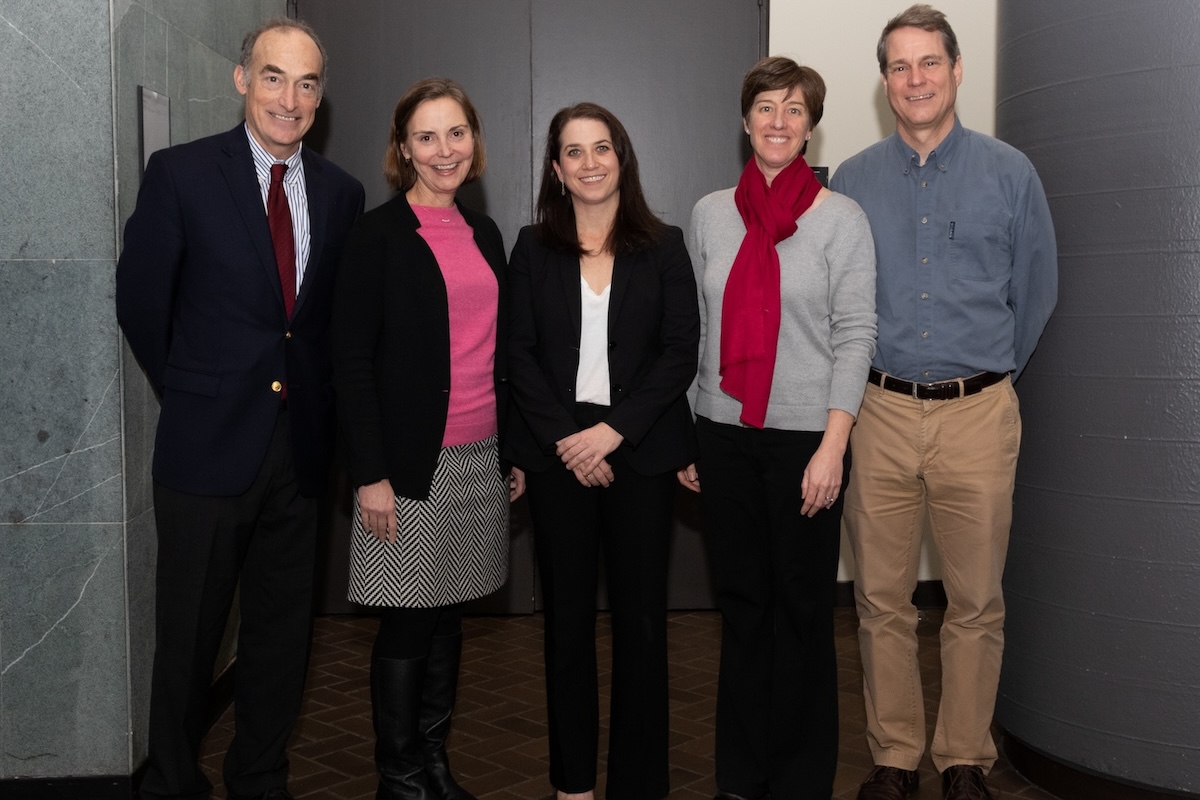
Clinic founder Bill Buzbee and Clinic Directors Mary Maclean Asbill, Mindy Goldstein, Julie Mayfield, and Jim Grode
Edward and Carole Walter Professor of Law William Buzbee helped found the clinic in 1998. A longtime Emory Law professor, he now leads Georgetown Law Center’s Environmental Law and Policy Program and serves on the clinic’s Advisory Board.
“The clinic has, year after year, exceeded our hopes for its place at Emory, in Atlanta, and for the larger environment,” Buzbee said. Since Georgia didn’t have many legal environmental advocates in 1998, one of the first goals was to create a legal resource for those battling well-funded opponents.
“Working on real matters, for real clients, with serious environmental stakes quickly engaged Emory's students,” Buzbee said. “The clinic also helped put Emory's environmental law offerings and program on the national map.”
While the clinic worked to protect the health and environment of communities in Georgia and across the country, it was also building a tradition of educating law students who would later make an impact in these same communities. The clinic’s former director Julie Mayfield is now a state senator in North Carolina’s Asheville district; another former director, Mary Maclean Asbill, leads the North Carolina offices of the Southern Environmental Law Center. Amneh Minkara 20L is deputy director of the Sierra Club's Building Electrification campaign. Jay Khuti 21L is an attorney advisor at EPA’s Region 4 in Atlanta. And Jill Kysor, a clinic fellow from 2013-2014, is now southeast policy director for the Energy Foundation.
“There’s no substitute for on-the-job training,” Kysor said. “As a fellow, I was able to take the lead in developing legal strategies and working with clients. Having that opportunity early in my legal career helped me quickly develop the skills, expertise and confidence needed to practice law.”
The clinic has tripled student enrollment since its inception and now annually enrolls about 24 students and provides more than 4,000 hours of pro bono legal representation, Goldstein said. That includes litigation, legislative and policy work, and negotiating contracts on behalf of clients who would otherwise go unrepresented.
Beyond good deeds, real cases are a real thrill when students prevail.
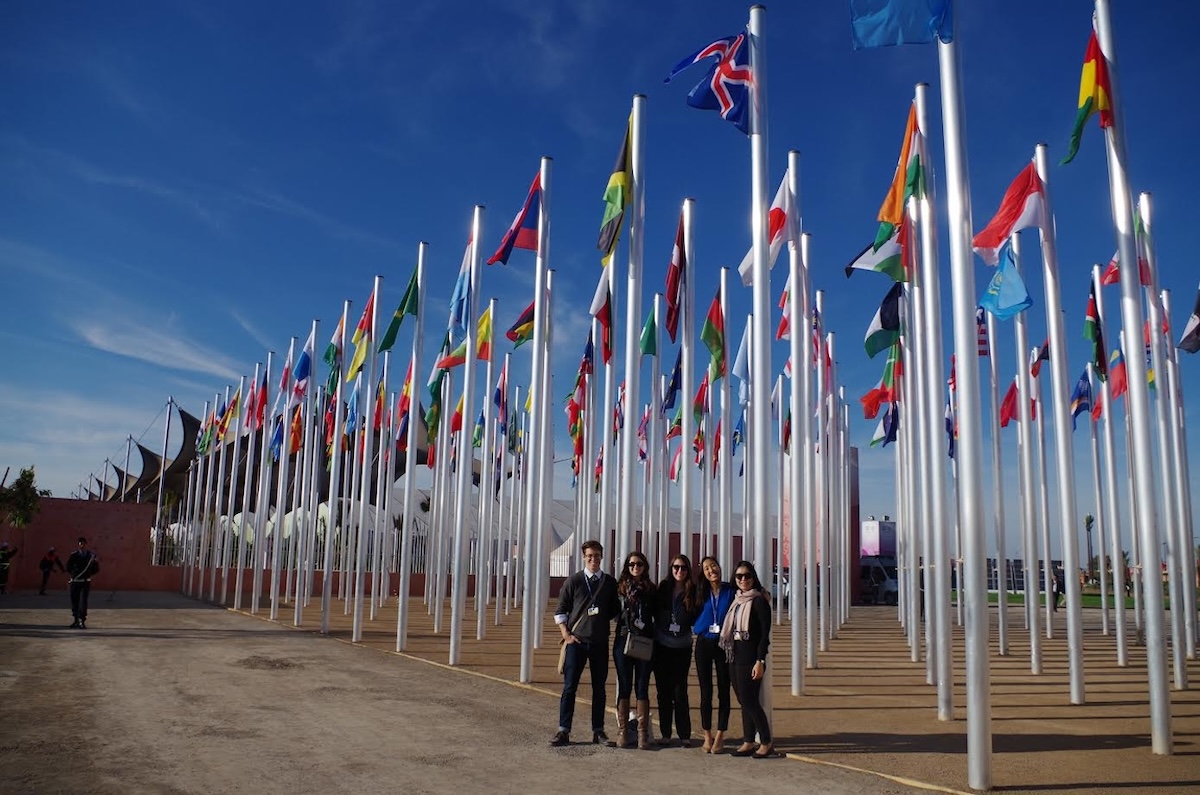
Clinic students at the United Nations Climate Change Conference held in Marrakesh in 2016
“We had a student argue before a federal agency, and I watched him knock it out of the park,” Goldstein said. “It was clear, not only that the agency was convinced by our claim, but that he was going to have an incredible career as a litigator.”
Whether they pursue environmental law or not, being a student attorney benefits them professionally and makes them aware of environmental impact. Hands-on experience ranges from conducting community trainings to finalizing a contract.
“Let’s say they've worked with a farmer who was going to put a conservation easement on their land—that’s a very complicated legal document and they were able to figure out the law, to draft the provisions, to sit in these negotiations and get it done,” Goldstein said. “That builds confidence important for all areas of legal practice.”
“Complex regulatory issues can take a long time, and a lot of our representations can take six, eight, ten years—and that's also a challenge and an opportunity for our students,” she said. “They're learning from the students that came before them, and they are passing on that knowledge to the students who come after them. We're often thrown in the middle, right? That's a legal skill in and of itself.”
One example is a case involving the storage of nuclear waste in New Mexico that the clinic has been involved in since 2016. Next spring, it goes before the Supreme Court, and students will draft an amicus brief. They will work with co-counsel Diane Curran, a veteran of legal proceedings on nuclear energy.
The clinic is also a beacon for the environmental community. They’ve hosted workshops on the National Environmental Policy Act and a Q & A with then administrator of the Environmental Protection Agency, Gina McCarthy. Rick Kuykendall, a litigator in the Deepwater Horizon oil spill in the Gulf of Mexico has visited. In 2019, Lois Gibbs, who battled to clean up Love Canal (which led to creating Superfund) was a keynote speaker at a clinic conference.
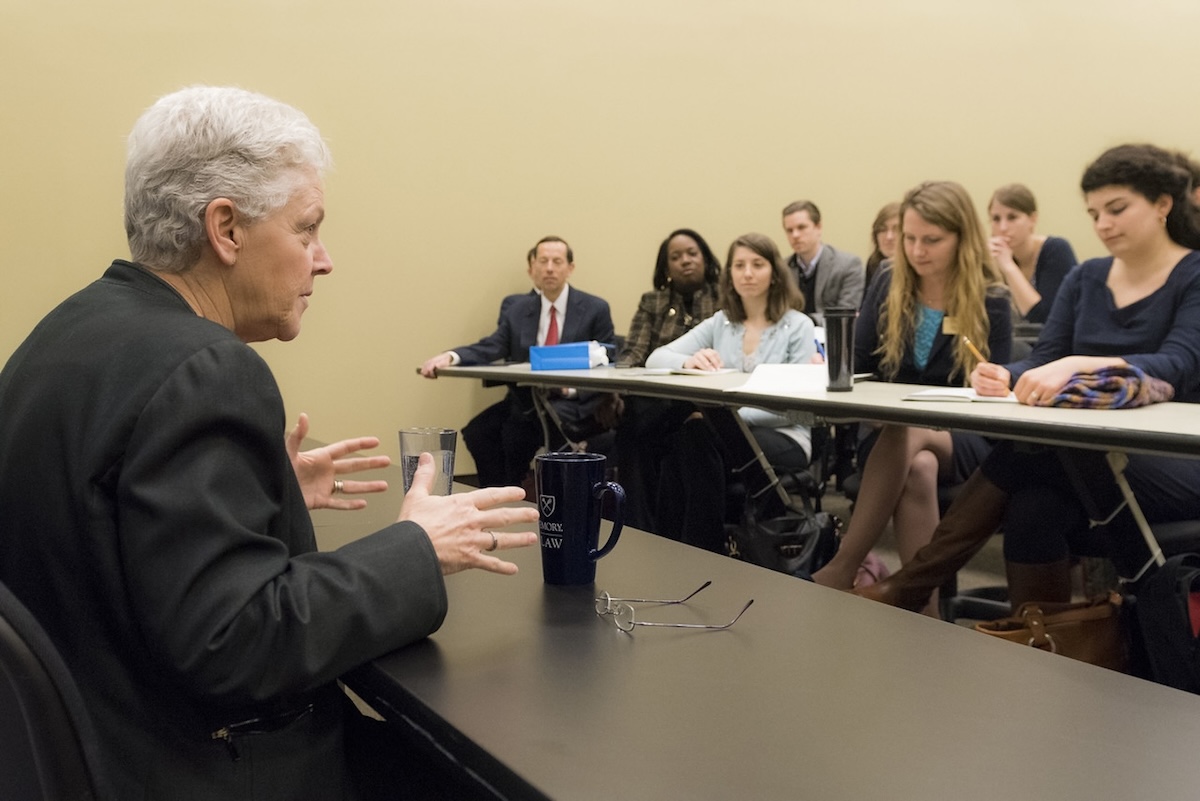
Then EPA Administrator Gina McCarthy speaks with clinic students.
The clinic is also one of the reasons Emory University has been placed in the Princeton Review’s top 10 Green Colleges list for the past four years.
“The clinic has been a tremendous resource for Emory and Emory Healthcare’s sustainability initiatives and in support of the greater Metro-Atlanta community,” said Ciannat Howett, Emory’s associate vice president for Resilience, Sustainability, and Economic Inclusion. Her office partnered with the clinic on work with The Conservation Fund’s Farms Fund and Emory’s 2023 Climate Action Plan. In Atlanta, the clinic has supported efforts for sustainable food access, solar installations, and efficiency retrofits. “The clinic’s work over the past 25 years is a wonderful example of Emory + Atlanta in our One Emory strategic vision,” Howett said.
Emory’s resources and graduate schools are a living laboratory, Goldstein says.
The clinic helps train medical students to understand the health implications of environmental justice, to better treat patients. They recently worked with faculty and students in environmental sciences to remediate lead contamination in west-side Atlanta. They’re also an ally in the pursuit of Emory’s ambitious plan to eliminate landfill waste. Goldstein has influenced the university’s emphasis on sustainable local food sources and supporting the next generation of the South’s small farmers. Also, given food waste’s very large carbon footprint, the clinic is helping research the possibility of siting an anaerobic digester on campus to create renewable natural gas.
In 2015, McCarthy visited Emory’s WaterHub (the first water recycling system of its kind that processes wastewater for non-potable uses like flushing toilets). She spoke with clinic students and later wrote to Goldstein: “You must be proud to know that you are educating the next generation of environmental lawyers and leaders who, judging from their questions, already have solid knowledge about America's public health and environmental challenges.”
Dean Richard Freer has watched the clinic grow into an important resource for both students and the public during his 40-plus years of teaching. He’s seen the impact of the experience students get in state and federal courts and agency hearings.
“I’ve spoken with students when they come home from Washington, and they’re thrilled to have met with a member of Congress or see their ideas come to life as they’re argued before a federal appellate judge,” Freer said. “It’s a fantastic way to prepare for practice, but it’s also a pretty heady day for a 2L or 3L to see how their work can make an impact.”
Given recent court decisions that affect the EPA and other agencies, Buzbee said environmental law is going to need another generation of strong advocates.
“The Supreme Court's recent line of cases have quite uniformly empowered courts, undercut agencies charged with environmental protection, and frustrated protective goals still in the nation's laws,” Buzbee said. “Students and lawyers will be sorting out this new legal landscape for years to come.”
So, the clinic’s work is even more important, and Goldstein says they’re up to the fight.
“It's the long arc, right?” she says. “It started in 1998 with this vision and this idea for environmental protection. Over 25 years, it stayed true to its vision while expanding its reach and impact. Now, we have this national reputation. Now we have a seat at the table, now we have a voice in these policy discussions.
“We've been described as punching above our weight,” she said. “While we may be small in size, we have found a way to help shape environmental law and policy in the United States while protecting communities. That's important work, and that won't change.”
Turner is one of the largest private landowners in America. His Flying D Ranch in Montana is spread over more than 100,000 acres – providing habitat for wildlife including bears, wolves, antelope and mountain lions, as well as a bison herd. It is also home to spectacular trout streams.
“It’s a myth that in order to make money, you have to trash the environment or that if you protect the environment it’s going to cost our nation in lost economic productivity,” Turner told Mountain Outlaw. “That mentality should have faded long ago, and truthfully, when it comes to the current state of our environment, we can’t afford to think that way anymore.”
“Clearly, I don’t believe everything is about profit,” Turner says. “But I’m pretty pleased with our return on investment in the clinic.”
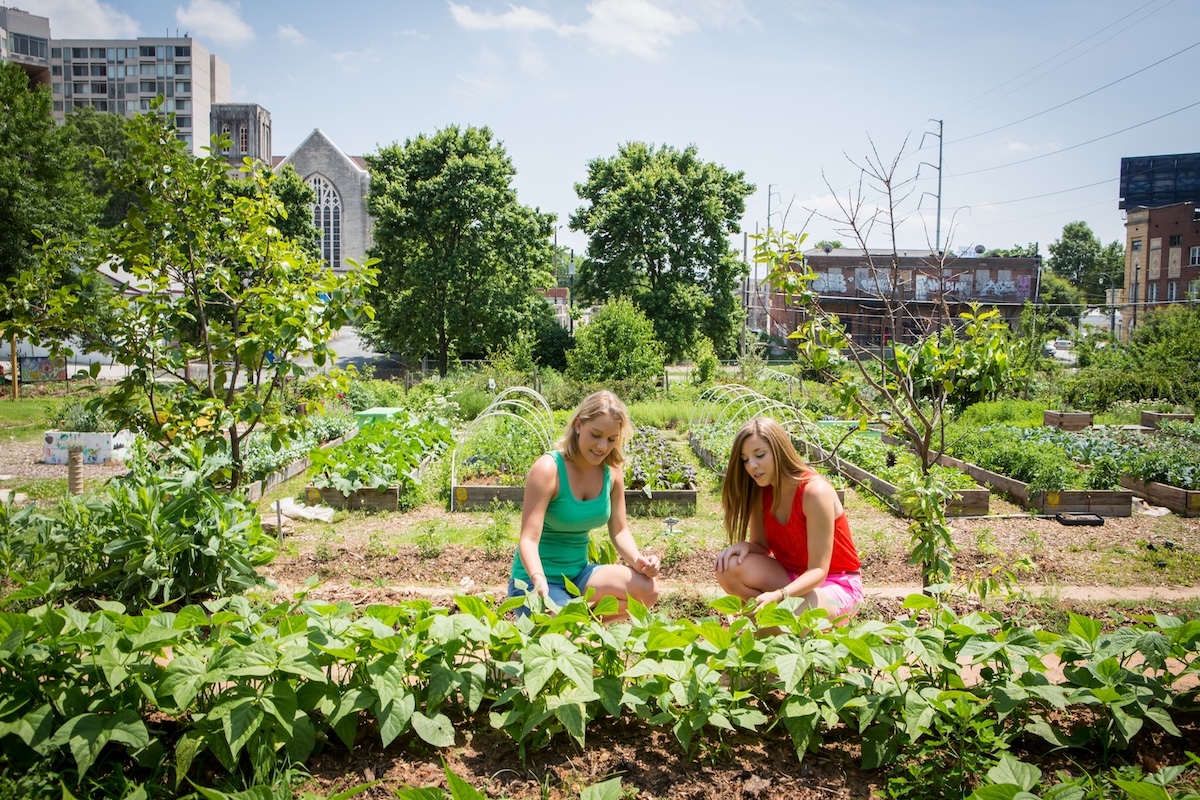
Clinic students at Atlanta’s Wheat Street Gardens